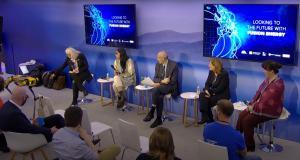COP26 Fusion et changement climatique : un commencement de dialogue
Quelle que soit l'identité de cet intercesseur, ITER et son co-intervenant l'UKAEA (United Kingdom Atomic Energy Authority) étaient déterminés à exploiter au mieux l'occasion qui se présentait à eux : un débat de 60 minutes dans la zone bleue diplomatique le dernier jour de la COP26, dans le cadre du groupe de discussion « Looking to the Future with Fusion Energy ».
Les échanges se sont montrés à la hauteur des ambitions du groupe, avec des débats animés et porteurs d'espoir. En début de séance, les participants se sont penchés sur la légitimité de la fusion dans le cadre de la COP26 et de son objectif d'énergie verte pour le futur. Comme l'a formulé Aneeqa Khan, « [La fusion] est capable d'assurer une production d'énergie de base stable lorsqu'il n'y a pas de vent ni de soleil. Aujourd'hui, ce sont les énergies fossiles qui jouent ce rôle, et nous devons mettre fin à cette situation. » Les participants ont ensuite conduit une réflexion sur les défis restant à relever en matière de technologie, de réglementation et de communication, sur la valeur du partenariat public-privé et de la coopération internationale, notamment la contribution grandissante des pays en développement, ainsi que sur l'importance de l'éducation, tant pour les citoyens que pour les prochaines générations de dirigeants du monde de la fusion.
Le résultat le plus révélateur de cette session est peut-être l'absence de controverse autour des différents échéanciers envisagés pour la commercialisation de la fusion, malgré la composition hétérogène du groupe de travail. L'objectif était plutôt de définir des modes de collaboration permettant de surmonter de manière plus efficace les obstacles qui demeurent. Le groupe de travail est resté focalisé sur la nécessité de l'innovation conjointe, de la fabrication à la formation, notamment lorsque l'un des membres du public a demandé à quelle échéance la fusion pourrait être commercialisée «si les gouvernements décidaient de traiter l'urgence climatique comme ils ont traité la pandémie de Covid-19», afin de concrétiser la promesse de la fusion « suffisamment vite pour qu'elle puisse changer les choses ».
Comme l'a souligné Jane Hotchkiss, de Energy for the Common Good, cette manifestation était en elle-même un tournant. « Nous assistons aujourd'hui à la prise en compte de l'énergie de fusion dans le débat climatique, ce qui est une première. »
Cliquez ici pour visionner l'intégralité du débat.


